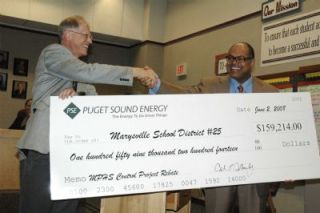MARYSVILLE Funded by the voter-approved bond issue passed in 2006, mechanical renovations to Marysville-Pilchuck High School began paying off in a big way recently.
At the districts June 2 board meeting, Puget Sound Energy presented school officials with a rebate check for $159,214.
Essentially, its a reward for doing the right thing, Dom Amor, PSEs local government and communications manager, stated after the presentation.
During the board meeting, PSEs Cal Shirley joked that his company essentially was paying the district for using less of his employers services.
Shirley is PSE Vice-President for Energy Efficiency Services.
I have the dubious responsibility for helping our company sell as little of its product as possible, Shirley said.
Pilchuck Maintenance Manager Keith Stefanson said the district began two years ago to replace heating equipment at the high school. Stefanson said much of the machinery dated back to when the school was first constructed. Other bits and pieces had been replaced piecemeal, meaning there were multiple types of systems installed around the campus.
Using $460,000 in bond proceeds, Stefanson said workers began updating and replacing equipment over the course of the last two years. He described the system now in place as state-of-the-art, with consistent technology in place throughout the schools various buildings.
As the project moved forward, PSE became involved due to contact with the high schools resource conservation group, which meets on a regular basis, Stefanson said. When PSE officials learned of the project, they began monitoring the work, eventually determining the renovations made the district eligible for the companys energy conservation program.
Besides the rebate presented at the board meeting, Stefanson said PSE estimates the changes at the high school will shave about $50,000 a year off the districts utility bills. As the district obtained the rebate through the use of voter-approved bond money, Stefanson said those dollars will be put into the bond fund.
High school project gains district energy rebate
MARYSVILLE Funded by the voter-approved bond issue passed in 2006, mechanical renovations to Marysville-Pilchuck High School began paying off in a big way recently.



